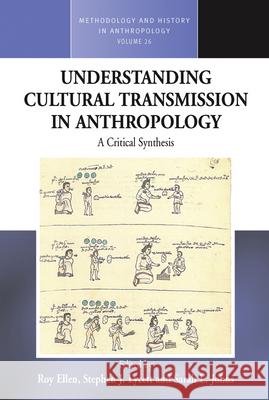Understanding Cultural Transmission in Anthropology: A Critical Synthesis » książka
Understanding Cultural Transmission in Anthropology: A Critical Synthesis
ISBN-13: 9781782380719 / Angielski / Miękka / 2013 / 392 str.
Understanding Cultural Transmission in Anthropology: A Critical Synthesis
ISBN-13: 9781782380719 / Angielski / Miękka / 2013 / 392 str.
(netto: 149,03 VAT: 5%)
Najniższa cena z 30 dni: 140,79
ok. 30 dni roboczych.
Darmowa dostawa!
The concept of "cultural transmission" is central to much contemporary anthropological theory, since successful human reproduction through social systems is essential for effective survival and for enhancing the adaptiveness of individual humans and local populations. Yet, what is understood by the phrase and how it might best be studied is highly contested. This book brings together contributions that reflect the current diversity of approaches - from the fields of biology, primatology, palaeoanthropology, psychology, social anthropology, ethnobiology, and archaeology - to examine social and cultural transmission from a range of perspectives and at different scales of generalization. The comprehensive introduction explores some of the problems and connections. Overall, the book provides a timely synthesis of current accounts of cultural transmission in relation to cognitive process, practical action, and local socio-ecological context, while linking these with explanations of longer-term evolutionary trajectories. Roy Ellen is Professor of Anthropology and Human Ecology at the University of Kent, Canterbury. His recent publications include On the Edge of the Banda Zone (University of Hawaii Press, 2003), The Categorical Impulse: Essays on the Anthropology of Classifying Behavior (Berghahn Books, 2006), and Nuaulu Religious Practices: The Frequency and Reproduction of Rituals in a Moluccan Society (KITLV Press, 2012). He is a Fellow of the British Academy and a member of its Council. He was President of the Royal Anthropological Institute between 2007 and 2011. Stephen J. Lycett is Senior Lecturer in Anthropology at the University of Kent, Canterbury. Trained in both biological anthropology and archaeology, his work is multidisciplinary, making extensive use of evolutionary principles and quantitative methodologies. His major research interests focus on integrating the biological, cultural, and technological aspects of evolution in humans, non-human primates, and fossil hominins. Sarah E. Johns is a Lecturer in Evolutionary Anthropology at the University of Kent, Canterbury. Her recent publications include"Red is not a proxy signal for female genitalia in humans" (PLoS ONE 2012); "Perceived environmental risk as a predictor of teenage motherhood in a British population" (Health and Place 2011); and "Teenage pregnancy and motherhood: How might evolutionary theory inform policy?" (Journal of Evolutionary Psychology 2011).
The concept of "cultural transmission" is central to much contemporary anthropological theory, since successful human reproduction through social systems is essential for effective survival and for enhancing the adaptiveness of individual humans and local populations. Yet, what is understood by the phrase and how it might best be studied is highly contested. This book brings together contributions that reflect the current diversity of approaches - from the fields of biology, primatology, palaeoanthropology, psychology, social anthropology, ethnobiology, and archaeology - to examine social and cultural transmission from a range of perspectives and at different scales of generalization. The comprehensive introduction explores some of the problems and connections. Overall, the book provides a timely synthesis of current accounts of cultural transmission in relation to cognitive process, practical action, and local socio-ecological context, while linking these with explanations of longer-term evolutionary trajectories.Roy Ellen is Professor of Anthropology and Human Ecology at the University of Kent, Canterbury. His recent publications include On the Edge of the Banda Zone (University of Hawaii Press, 2003), The Categorical Impulse: Essays on the Anthropology of Classifying Behavior (Berghahn Books, 2006), and Nuaulu Religious Practices: The Frequency and Reproduction of Rituals in a Moluccan Society (KITLV Press, 2012). He is a Fellow of the British Academy and a member of its Council. He was President of the Royal Anthropological Institute between 2007 and 2011.Stephen J. Lycett is Senior Lecturer in Anthropology at the University of Kent, Canterbury. Trained in both biological anthropology and archaeology, his work is multidisciplinary, making extensive use of evolutionary principles and quantitative methodologies. His major research interests focus on integrating the biological, cultural, and technological aspects of evolution in humans, non-human primates, and fossil hominins.Sarah E. Johns is a Lecturer in Evolutionary Anthropology at the University of Kent, Canterbury. Her recent publications include"Red is not a proxy signal for female genitalia in humans" (PLoS ONE 2012); "Perceived environmental risk as a predictor of teenage motherhood in a British population" (Health and Place 2011); and "Teenage pregnancy and motherhood: How might evolutionary theory inform policy?" (Journal of Evolutionary Psychology 2011).











